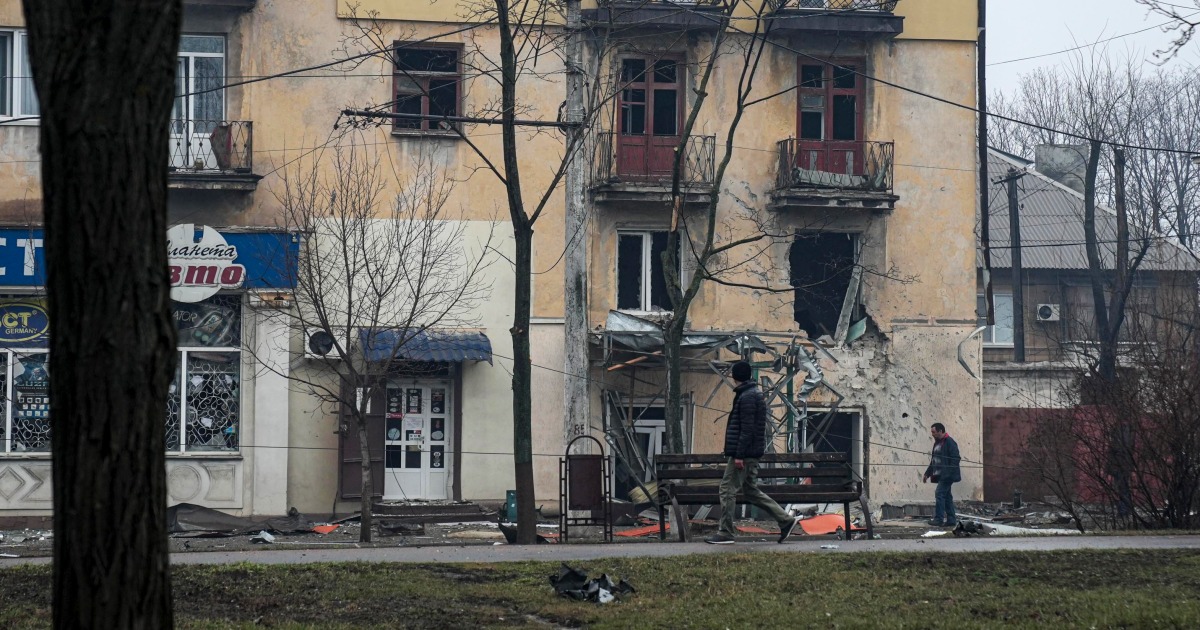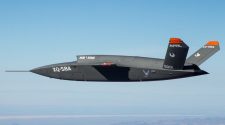A Ukrainian city that has been besieged by Russian forces said it was postponing a planned evacuation of its civilians Saturday after Russia failed to adhere to a cease-fire announced hours earlier.
Russia and Ukraine said they had agreed to a temporary cease-fire early Saturday in the key port city, Mariupol, and smaller nearby city Volnovakha to allow the creation of humanitarian corridors to evacuate civilians.
But shortly after the evacuations were set to begin, Mariupol’s city council said that Russian forces continued shelling the city and surrounding areas.
“We ask all Mariupol residents to disperse and follow to the places of shelter,” it said in a post on Telegram, adding that negotiations were ongoing to ensure a safe route out of the city, which has been encircled and bombarded for days.
Russia has consistently denied targeting civilians. Without offering evidence, the country’s defense ministry said no one had made use of the corridors and accused Ukrainian “nationalists” of preventing civilians from leaving, the RIA state news agency reported.
Latest developments on Ukraine:
- Russia and Ukraine announce limited cease-fire to let civilians leave two besieged cities.
- Mariupol, the key port city, says it is postponing its evacuation after Russian forces violated the cease-fire.
- Zelenskyy accuses NATO of giving Russia “green light” to continue shelling his country.
- The Kremlin cracks down on dissent at home, limiting media and blocking Facebook.
The announcement of a limited cease-fire had appeared to represent the first breakthrough in allowing civilians to escape a Russian assault that has brought death and destruction to the country.
The move came after a second round of talks between the two countries earlier this week produced an agreement on the creation of humanitarian corridors, though no progress was made on a broader halt to Moscow’s attack on its democratic neighbor.
Since he launched the invasion nine days ago, Russian President Vladimir Putin has seen his military struggle against staunch resistance on the ground and moved increasingly to bombarding cities and towns from the air.
The conflict has fueled a growing humanitarian crisis and left Moscow facing global condemnation, isolation and crippling economic sanctions.
Russia’s attacks on Mariupol, a large southeastern city on the Azov Sea, have hit critical infrastructure and left it without water, heat or electricity.
The strategic port city has remained in Ukrainian hands, but its council has accused Russia of creating a “humanitarian catastrophe” and hindering the supply of food.
Mariupol’s city council said evacuations would take place in stages over several days, with the first window between 4 a.m. ET and 9 a.m. ET. Saturday. It said the corridor would extend to the city of Zaporizhzhia, about 140 miles away.
The corridor would allow the restoration of critical infrastructure to begin and make it possible to deliver medicine and other supplies, the council said, adding that civilians would be able to leave using designated bus routes and their own cars. Drivers should “fill the vehicles as much as possible,” it said.
However just before 6 a.m. ET the city council posted an urgent update telling residents the evacuation was postponed and they should seek shelter, with Russian shelling seemingly ongoing.
Ukraine’s deputy prime minister, Iryna Vereschuk, also accused Russian forces of “shelling Volnovakha with heavy weapons” in a video posted to Telegram. She added that there was ongoing fighting on the route between Mariupol and Zaporizhzhia.
“I hereby state that Russia has violated this agreement, failed to fulfill its duty,” she said.
Her comments came ahead of a planned video conference briefing by Ukraine’s President Volodymyr Zelenskyy to U.S. senators on Saturday, as Congress considers a request for $10 billion in emergency funding for humanitarian aid and security needs.
On Friday, Zelenskyy lashed out at NATO for rejecting a no-fly zone above Ukraine, arguing the decision was giving Russia a “green light” to continue shelling his country.
The United States and its Western allies have said that such a move would be likely to put them on course for a direct military confrontation with Russia and risk a wider war.
Russian forces have made key gains in the south in recent days, seizing control of the city of Kherson, further along the coast, and Europe’s largest nuclear power plant after an attack that sparked a fire and brief fears of nuclear meltdown.
But its progress has come with an intensifying aerial assault on civilian areas across Ukraine, driving a rapid exodus that has seen more than 1 million people flee the country while others have been left to shelter in their basements or local metro stations.
In an update early Saturday, Britain’s ministry of defense said that the overall rate of Russian air and artillery strikes appeared to have fallen in the past 24 hours, however.
It added that Russian forces were “probably advancing on the southern port city of Mykolaiv,” and it was possible some would continue on to Odessa, a crucial port. If captured it could largely shut the country off from international shipping.
Russia’s campaign in northern Ukraine has struggled to make similar progress, but the ministry of defense update said that in addition to Mariupol it was “highly likely” that Kharkiv, Ukraine’s second-largest city, as well as Sumy and Chernihiv, were encircled by Russian forces. There were also reports of street fighting in Sumy, it said.
Fierce defense in those cities has helped thwart a Russian advance on Kyiv, the capital.
Putin’s initial aim seemed to be the overthrow of Zelenskyy’s Western-leaning government in order to install a regime friendlier to the Kremlin and restore Moscow’s influence over its neighbors three decades after the fall of the Soviet Union.
But dogged Ukrainian resistance has slowed the advance of Russian troops, fueling fears that Moscow could resort to more brutal violence and escalate what is already one of the most intense military conflicts on the continent since World War II.
Since Russia invaded on Feb. 24, there have been 1,006 civilian casualties, including at least 331 civilian deaths and 19 children, the United Nations human rights office said Friday, although it noted the “real toll is much higher.”
Fearing Russian attacks, tens of thousands of people have packed train stations in Kyiv and elsewhere to head west to cities like Lviv, which has become a hub for diplomatic efforts and news media.
Aid agencies have warned of a humanitarian disaster across the country as food, water and medical supplies run short. The number of refugees could rise to 1.5 million by the end of the weekend from a current 1.3 million, the head of the United Nations refugee agency said Saturday.














